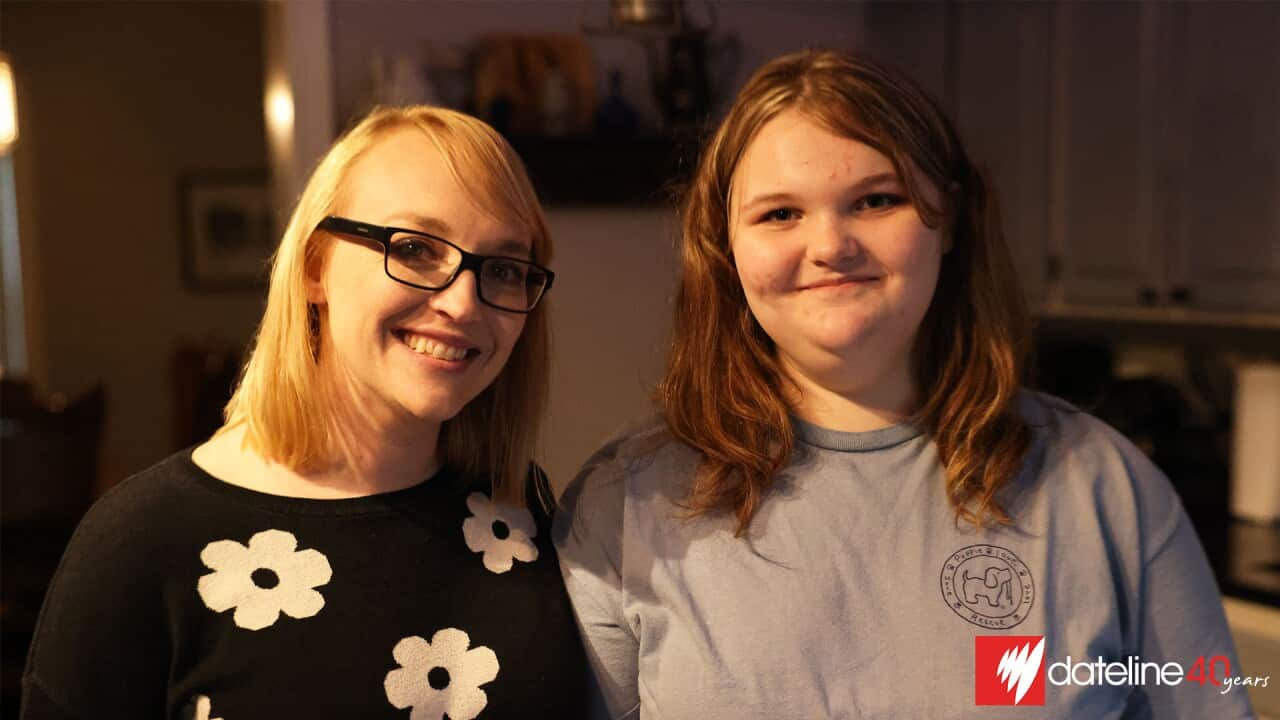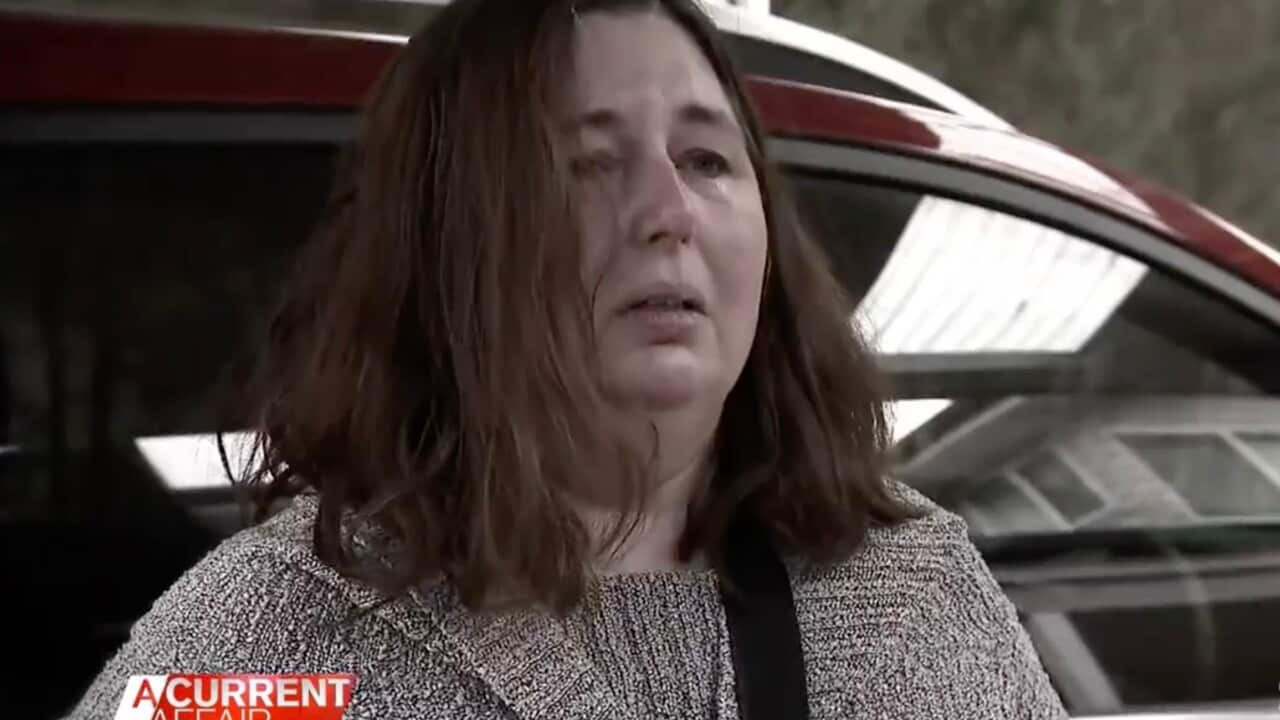Stream free On Demand

Born Big
episode • Dateline • news and current affairs • 28m
episode • Dateline • news and current affairs • 28m
In Port Deposit, Maryland, a small town some 120km from Washington DC, a family sits down for dinner. Ham, broccoli and potatoes — a standard meal. But for Lexi, her portion of food is far less than what the rest of the family eats.
She cuts up her smaller portion into even smaller pieces.
"It's easier for me to digest so it's easier on my stomach," Lexi says.
Lexi is 13. She has Class 3 obesity, a chronic condition known as morbid obesity. Eighteen months ago, Lexi had bariatric surgery, which removed 80 per cent of her stomach.
Changing her meal sizes after surgery was not easy. At first, she was shocked by the new portion, "I can't eat (only) this much, but then you kind of get the hang of it and realise ... you can't even eat most of it."
Forty-two per cent of American adults, or roughly 108 million, now classify as obese, a rate that's doubled since the 1980s. One in five children and adolescents in the country is affected by obesity. It's a growing health crisis, and parents are now turning to radical treatments like surgery and weight loss medicines to treat their children.
In January 2023, the American Academy of Pediatrics (AAP) revised its guidelines for treating children with obesity for the first time in 15 years. It is now recommending early medical interventions such as surgery and weight-loss drugs, in addition to lifestyle and behaviour changes. The update highlighted a change in thinking about obesity, from a ", to a disease akin to asthma, diabetes, or cancer that needs to be treated early.

Of Brandy's three children, only Lexi has weight issues due to a genetic disorder. Source: SBS / Dateline
Brandy first noticed her daughter's abnormal hunger early on and began to worry when she started putting on weight from the age of four. Of her three children, only Lexi has had weight issues.
"I have three children that I feed the same and only one of them is struggling,"Brandy told SBS Dateline.
"The paediatrician that I had at the time, his answer was always, 'Stop feeding her McDonald's'. I'm like, 'I'm not!'"
"I have tried everything. Atkins, portion control, sugar control, carb control, any type of exercise, and nothing is changing for her."
Obesity has long been linked to diet, exercise, and socio-economic factors. But recent studies point to genetic factors behind rapid weight gain in children.
Lexi has a malfunctioning gene — MC4R — that's responsible for food intake and weight control. This genetic disorder keeps the brain in a constant state of hunger, which leads to over-eating and obesity.
By 12, Lexi weighed 116kg, around three times more than the average American girl her age. At school, she says, she was bullied and judged for her size.
"Kids have sent me pictures of food and told me don't eat my phone and stuff like [that]. It's really bad," she said. "Kids sent some death threats, telling me to kill myself and [that] nobody would miss me."
Seeing her daughter struggle, Brandy started looking into treatments for childhood obesity and came across bariatric surgery.
"I was so terrified that she was going to end up one of those 600-pound people by the time she was 20, and the detriment to her health that that would have on her," Brandy said.
"I was scared that I was going to outlive this child. And I knew that we had to do something different."
After the surgery, Lexi lost a staggering 29kg. Then her weight loss stalled.

Lexi after her bariatric surgery that had 60 percent of her stomach removed Source: Supplied
Bariatric surgery
Bariatric surgery is the term used for two common operations on the digestive system that reduces the size of the stomach.
Despite the high cost — an average of $35,000 — these surgeries have become more common among American youth. The number of teens who had bariatric surgery nearly doubled between 2010 and 2017.
The recent updates to AAP guidelines recommend early and more aggressive treatment of childhood obesity. Now, children over the age of 13 with severe forms of obesity may be candidates for bariatric surgery. And children from age 12 can be put on weight-loss medications.
The move sparked debate: should surgeries that permanently alter the digestive system be done on children and teenagers?
I was so terrified that she was going to end up one of those 600-pound people by the time she was 20, and the detriment to her health that that would have on her.Brandy, Lexi's mother
Dr Evan Nadler, one of the country's leading paediatric surgeons, has performed bariatric surgery on children as young as five. He says, "For me, it's fairly simple. If your weight is negatively affecting your health, and I have a procedure that can fix that, then I offer it."
"If you had cancer, no one talks about, should this patient be eligible to have their cancer removed? We just do it."
"It's only in obesity where we talk about all these different criteria. And much of it is, I think, unfortunately, due to the stigma and bias around the disease of obesity."

Dr Evan Nadler is one of the leading paediatric surgeons in the US. He has performed bariatric surgery on children as young as five. Source: SBS / Colin Cosier for Dateline
After her initial weight loss, she has regained 9kg. And her hunger hasn't gone away.
So, she and her mother have been looking for alternative solutions.
The promise of weight-loss drugs
The AAP now recommends weight-loss drugs such as semaglutide for children as young as 12. More commonly known as Ozempic and Wegovy, this antidiabetic medication suppresses appetite and
At the end of 2022, the US Food and Drug Administration (FDA) approved Wegovy for the treatment of obesity in children over the age of 12. Ozempic, approved by the FDA to treat type 2 diabetes, has been prescribed 'off-label' for weight loss.
Brandy is hopeful and apprehensive at the same time.
Not only is the drug expensive and reportedly associated with a wide range of side effects from stomach pain or vomiting to much less common but more serious gastrointestinal issues; patients must take it indefinitely to maintain results. The drugs' long-term effects on physical and mental health are little studied.

Lexi's genetic disorder, which keeps her constantly hungry, has rendered her bariatric surgery ineffective. So she's hoping weight-loss drugs could help her. Source: SBS / Colin Cosier for Dateline
But first, they need to find it as semaglutide drugs remain in shortage in the US.
Struggling to keep pace with soaring demand, Novo Nordisk, the Danish manufacturer of Wegovy and Ozempic, has limited supplies to the US to safeguard access to these medications for current patients.
Fighting weight stigma
Ragen Chastain speaks and writes a lot about weight stigma and what she calls 'medical fatphobia' and is concerned about the changes in the obesity treatment guidelines for children and teens.
"What these surgeries do at their root is they mutilate a kid's digestive system, for life. And they mimic behaviours that would be considered eating disorder behaviours, but for higher-weight kids, it's considered healthcare".
Nadler rejects the claim a healthy digestive system is altered.
"We are providing a treatment and cure for metabolic disease," he said. "What we've done for so many of these kids, we've changed them from being an outcast to just being another kid."

Ragen Chastain, a body neutrality advocate, says higher-weight people face discrimination within medical care and is concerned about the changes in the obesity treatment guidelines for children and teens. Source: SBS / Colin Cosier for Dateline
"It can cause misdiagnoses for higher weight people when instead of investigating and finding out that someone, for example, has cancer, they simply say, 'Oh, try losing weight and see if you don't feel better after that.' So it causes delayed diagnosis, delayed care."
Chastain advocates for body neutrality, or accepting your body as it is, and says it's possible to lead a healthy and fulfilling life while being overweight. She is a dancer, triathlete, and marathon runner.
"Fat people have the right to exist without shame, stigma, bullying, or oppression," she said. "To suggest that people simply existing is a crisis or a problem or should be irradicated, is deeply troubling."
Back in Maryland, 13-year-old Lexi agrees. She says, "I don't think anybody should be judged on their weight because it's honestly just not fair."
But Lexi and Brandy also don't want to be judged for seeking treatment for obesity. Lexi says, "It's difficult. It's like you're trapped in your body, like the body that you don't want, and it's not yours."
As they both continue to try and find a treatment that will work for Lexi, Brandy says, "I just want her to be happy more than anything. I've watched her struggle for 13 years. I just want her to find her way."
Readers seeking support for eating disorders and body image concerns can contact Butterfly Foundation on 1800 33 4673. More information is available at














